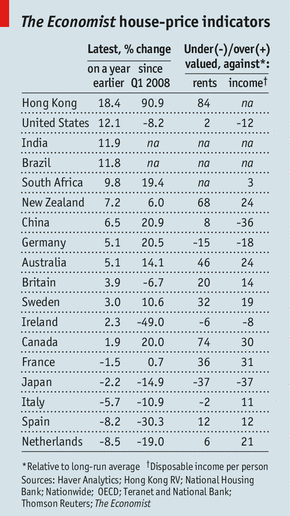Global house prices
全球房?jī)r(jià)
Mixed messages
混亂的信息
America surges, much of Europe sinks
美國(guó)房?jī)r(jià)上漲,歐洲房?jī)r(jià)下跌
Aug 31st 2013 |From the print edition

HOUSING markets are prone to boom-and-bust cycles, with prices overshooting then undershooting sustainable levels. To work out whether they are over- or undervalued, The Economist uses two gauges. One assesses affordability by comparing prices with disposable income. The other considers the case for investing in housing by comparing prices with rents. If these ratios are higher than their historical averages (since the mid-1970s) property is overvalued; if they are lower it is undervalued. On this basis, Canada’s house prices are bubbly whereas Japan’s are undeservedly flat (see table).
房地產(chǎn)市場(chǎng)容易在可持續(xù)水平上下波動(dòng)從而形成漲跌周期。為了衡量房?jī)r(jià)被高估還是低估,經(jīng)濟(jì)學(xué)人采用了兩種測(cè)量方法。第一種是比較可支配收入與房?jī)r(jià)水平,第二種是考慮租金與房?jī)r(jià)的關(guān)系。如果這些比率高于自70年代中期以來(lái)的歷史平均值,那么房地產(chǎn)市場(chǎng)就被高估了。如果低于歷史水平,那么房地產(chǎn)市場(chǎng)被低估了。基于此,加拿大的房?jī)r(jià)有泡沫,而日本的房?jī)r(jià)則出奇的穩(wěn)定。(見(jiàn)表)
America’s formerly stricken market has rebounded: house prices have risen by 12.1% over the past year. But the recovery still appears to be sound, since prices remain undervalued against income. A sharp rise in mortgage rates since May, on signs that the Federal Reserve will shortly slow the pace of asset purchases, may in any case temper the boom.
美國(guó)曾經(jīng)低迷的市場(chǎng)有所起色:過(guò)去一年房?jī)r(jià)上漲了12.1%。但是恢復(fù)似乎有點(diǎn)過(guò)于平靜,因?yàn)榕c收入掛鉤的話,房?jī)r(jià)明顯過(guò)低。自從五月以來(lái)的抵押貸款利率激增,這標(biāo)志著美聯(lián)儲(chǔ)短期內(nèi)將會(huì)放緩房地產(chǎn)購(gòu)買節(jié)奏,這可能放緩經(jīng)濟(jì)繁榮的步伐。
Britain’s recovery is built on shakier foundations. House-price growth has picked up in recent months to 3.9% and is likely to accelerate further, even though valuations are still overstretched. The market is being buoyed through a subsidy scheme that lowers funding costs for mortgage lenders and through special help for low-deposit borrowers.
英國(guó)的復(fù)蘇建立在極不穩(wěn)定的基礎(chǔ)上。近幾個(gè)月房?jī)r(jià)已增長(zhǎng)了3.9%,盡管估價(jià)仍就過(guò)高,但是未來(lái)還有加速增長(zhǎng)的趨勢(shì)。房地產(chǎn)市場(chǎng)的好轉(zhuǎn)由補(bǔ)貼政策支撐。補(bǔ)貼政策降低抵押貸款者的花費(fèi),對(duì)低收入者有特殊幫助方法。
Despite favourable valuations, Japanese house prices continue to fall, though at a modest 2.2%. The worst-performing markets are in the euro area, notably in southern Europe (Spanish prices are down by 8.2% in the past year) but also in some northern countries (Dutch prices have fallen by 8.5%). The French market is also depressed. Valuations remain stretched in Spain even though house prices have fallen by 30% since early 2008. But the recent pick-up in the Irish market looks sustainable following a 49% price crash.
盡管估價(jià)較好,但是日本的房?jī)r(jià)持續(xù)下落,最新數(shù)據(jù)顯示下降了2.2%。表現(xiàn)最差的市場(chǎng)在歐洲,最差的在南歐(西班牙房?jī)r(jià)在過(guò)去一年中下降了8.2%)。但是在北歐也有表現(xiàn)很差的國(guó)家(荷蘭的房?jī)r(jià)下降了8.5%)。法國(guó)的房地產(chǎn)市場(chǎng)也很低迷。盡管自2008年以來(lái)西班牙的房?jī)r(jià)已經(jīng)下降了30%,但是其估價(jià)仍就過(guò)高。然而最近數(shù)據(jù)顯示,愛(ài)爾蘭房地產(chǎn)市場(chǎng)在房?jī)r(jià)暴跌49%以后看起來(lái)穩(wěn)定了不少。
Brighter signs gleam elsewhere, especially in Germany, which avoided the pre-crisis frenzy. Prices there have risen in the past year by 5.1%, which should bolster domestic demand and help support the economic recovery in the euro zone.
其他地方則有好消息,尤其是在德國(guó),德國(guó)避開了危機(jī)前的房產(chǎn)狂熱。在過(guò)去的一年里,德國(guó)房?jī)r(jià)上漲了5.1%,擴(kuò)大了國(guó)內(nèi)需求并有利于歐元區(qū)的經(jīng)濟(jì)復(fù)蘇。











